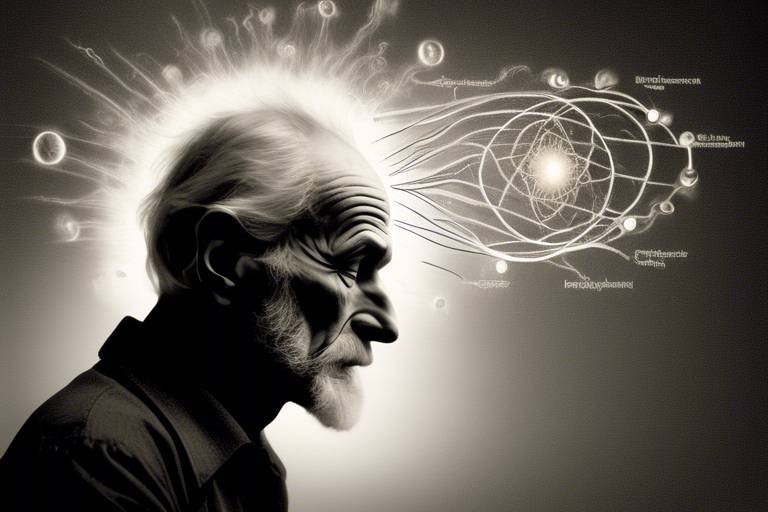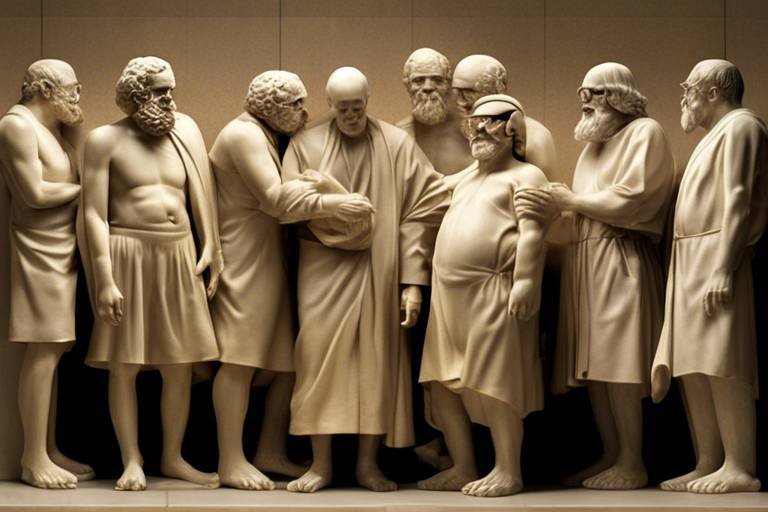Essence and Existence - A Look into Metaphysics
Welcome to the fascinating world of metaphysics, where we dive deep into the intricate relationship between essence and existence. These two concepts are not just philosophical jargon; they form the very foundation of our understanding of reality and being. Imagine essence as the blueprint of a building, defining what it is, while existence is the actual structure standing tall in the world. Together, they raise profound questions about identity, meaning, and our place in the universe. So, grab a cup of coffee, sit back, and let’s embark on this intellectual journey that challenges our perceptions and ignites our curiosity.
Essence is often described as the core nature of a being, encapsulating its defining characteristics. Think of it as the soul of an entity, the qualities that make it what it is. Philosophers have long debated the significance of essence in understanding identity. For instance, Aristotle viewed essence as the "whatness" of a thing, arguing that to understand an object, we must grasp its essence. This idea raises intriguing questions: What makes you, you? Is it your thoughts, your experiences, or perhaps something more profound? In essence, understanding essence helps us navigate the complexities of identity and existence.
Existence, on the other hand, refers to the state of being or the reality of an entity. It’s the tangible aspect of life that we can perceive and interact with. Different philosophical schools offer varying interpretations of existence. Existentialism, for example, focuses on individual existence, freedom, and choice, emphasizing that our existence precedes our essence. This perspective challenges us to consider how our choices shape who we are. On the flip side, realism posits that entities exist independently of our perceptions, suggesting that reality is objective and not merely a construct of our minds. This contrast between subjective and objective interpretations of existence invites us to ponder: Does our perception alter reality, or is it merely a reflection of it?
Existentialism takes a bold stance by placing individual existence at the forefront. Think of existentialists like Jean-Paul Sartre and Søren Kierkegaard as the champions of personal freedom. They argue that our existence is a primary concern, and through our choices, we define our essence. This idea can be both liberating and daunting. After all, if we are responsible for our essence, then our choices carry significant weight. This leads us to the concept of freedom and responsibility, where the freedom to choose is intricately linked to the responsibility of those choices. It’s like being handed the keys to a car; you can drive wherever you want, but you must also navigate the road safely.
In existential thought, freedom isn’t just about doing what you want; it’s about understanding the consequences of your actions. This intertwining of freedom and responsibility shapes our essence and existence, leading to profound moral and ethical implications. When we make choices, we not only define ourselves but also influence the world around us. It’s a ripple effect that can lead to both positive and negative outcomes. So, how do we ensure our choices align with our essence? This question is at the heart of existential inquiry.
Another crucial theme in existentialism is authenticity. Living authentically means aligning your essence with your existence, fostering genuine experiences and a true sense of self. It’s about shedding societal expectations and embracing who you really are. Imagine trying to fit into a mold that doesn’t suit you; it’s uncomfortable and ultimately unsustainable. Authenticity encourages us to break free from those molds, allowing us to live in a way that resonates with our true selves.
While existentialism emphasizes subjective experience, realism offers a contrasting view by asserting that entities exist independently of our perceptions. This perspective shapes our understanding of existence as something objective, a reality that exists whether we acknowledge it or not. Realism challenges us to consider the implications of a world that exists outside our consciousness. Are there truths that remain hidden from us? This question invites a deeper exploration of reality, urging us to seek knowledge beyond our personal experiences.
The debate between essence and existence is a pivotal discussion in metaphysics, with key philosophers like Thomas Aquinas and Martin Heidegger offering differing views. Aquinas argued that essence is prior to existence, suggesting that the essence of a thing defines its existence. In contrast, Heidegger contended that existence is fundamental, asserting that we must first exist to then understand our essence. This ongoing dialogue invites us to reflect on our beliefs and assumptions about reality.
Various philosophical arguments have emerged regarding essence and existence, each contributing to the rich tapestry of metaphysical thought. Historical figures have provided significant insights that continue to resonate today. For instance, Plato's theory of forms suggests that essence is a perfect ideal, while Aristotle's emphasis on substance grounds essence in the physical world. These contrasting views highlight the complexity of understanding our reality.
The essence and existence debate remains relevant in modern philosophy, influencing contemporary thinkers as they grapple with current issues in science, ethics, and personal identity. As we face challenges like technological advancements and ethical dilemmas, the questions surrounding essence and existence become increasingly pertinent. How do we define our identity in a rapidly changing world? What does it mean to exist in the digital age? These questions propel us forward, inviting ongoing exploration and reflection.
- What is the difference between essence and existence? Essence refers to the fundamental nature of a thing, while existence pertains to its state of being.
- How does existentialism view existence? Existentialism emphasizes individual existence, freedom, and the choices that define one's essence.
- What role does authenticity play in existence? Authenticity involves aligning one's essence with existence, fostering genuine experiences and self-understanding.
- Why is the essence vs. existence debate important? This debate shapes our understanding of reality, identity, and our place in the world.

The Concept of Essence
Essence is one of those philosophical terms that often gets tossed around in discussions about identity and existence, but what does it really mean? At its core, essence refers to the fundamental nature of a thing—those defining characteristics that make it what it is. Think of essence as the DNA of an object or idea; it encapsulates the traits that are necessary for something to be recognized as itself. For instance, the essence of a tree might include its ability to photosynthesize, its bark, and its leaves. Without these characteristics, it wouldn’t be a tree, would it?
Philosophers throughout history have grappled with the concept of essence. In ancient times, Plato posited that every object has an ideal form, a perfect essence that transcends its physical manifestation. This idea suggests that while we may encounter various imperfect trees in the world, they all share the essence of "tree-ness." Aristotle, on the other hand, took a more empirical approach, arguing that essence is found within the object itself rather than in some abstract realm.
In contemporary philosophy, the significance of essence extends beyond mere categorization. It serves as a foundation for understanding identity. For example, consider a person. What makes someone who they are? Is it their memories, their choices, or perhaps their biological makeup? The essence of a person can be viewed as a combination of these elements, creating a unique identity. This leads us to ponder questions like: If someone undergoes a significant change—physically or psychologically—do they remain the same person? This inquiry opens a door to the complexities surrounding the relationship between essence and existence.
Moreover, essence is not just a static characteristic; it can evolve. As individuals grow and experience life, their essence may shift. This fluidity can be both liberating and daunting. It prompts us to examine how we define ourselves and what it means to be authentic. Are we merely the sum of our experiences, or is there a deeper, unchanging essence that defines us? The interplay between essence and existence invites a rich dialogue about identity, purpose, and the very nature of reality.
To illustrate the concept of essence further, consider the following table that summarizes key philosophical perspectives:
| Philosopher | View on Essence |
|---|---|
| Plato | Essence exists in an ideal realm, separate from physical manifestations. |
| Aristotle | Essence is found within the object itself and is tied to its purpose. |
| Heidegger | Essence is linked to existence; understanding one requires understanding the other. |
In summary, the concept of essence is a multifaceted topic that has evolved through the ages. It serves as a crucial element in understanding not just what things are, but also how they relate to our existence and identity. The exploration of essence invites us to reflect on the very nature of being, making it a vital aspect of metaphysical inquiry.

Understanding Existence
When we dive into the concept of existence, we're stepping into a vast ocean of philosophical inquiry that seeks to unravel what it truly means to be. Existence isn't just a simple state of being; it's a complex web of realities that encompasses everything from the mundane to the extraordinary. Think about it: every time you wake up, breathe, or even ponder your own thoughts, you're engaging with the very essence of existence. But what does it mean to exist? How do different philosophies interpret this state? Let's explore some of the diverse perspectives that have emerged over the centuries.
At its core, existence relates to the condition of being present in reality. This might sound straightforward, but it opens up a treasure trove of questions. For instance, does existence precede essence? Or do we have an essence that defines our existence? These questions have puzzled philosophers for ages. Existentialism, a philosophy that emphasizes individual experience, freedom, and choice, argues that existence comes first. Think of it like this: before you can define who you are (your essence), you must first acknowledge that you are (your existence). This perspective shifts the focus from predetermined definitions to the unique experiences that shape our identities.
In contrast, realism posits that existence is independent of our perceptions. In this view, entities exist whether or not we are aware of them. This raises an intriguing point: if a tree falls in a forest and no one is there to hear it, does it still make a sound? Realists would argue yes, it does. This perspective emphasizes a more objective understanding of existence, suggesting that our individual experiences are just a small part of a much larger reality.
To further illustrate these contrasting views, consider the following table:
| Philosophy | Key Idea | Implication |
|---|---|---|
| Existentialism | Existence precedes essence | Personal identity is shaped by choices and experiences |
| Realism | Existence is independent of perception | Entities exist regardless of human awareness |
As we navigate these philosophical waters, it becomes clear that understanding existence is not just an academic exercise; it has profound implications for our daily lives. For instance, consider how our beliefs about existence influence our decisions and interactions with others. If we subscribe to existentialist thought, we might see ourselves as architects of our own identities, responsible for our choices. On the other hand, a realist perspective might lead us to appreciate the objective truths of the world around us, grounding our experiences in a reality that exists beyond our subjective interpretations.
In conclusion, the exploration of existence is a multifaceted journey that challenges us to consider not only what it means to be but also how we relate to the world around us. By examining different philosophical perspectives, we can gain a deeper understanding of our place in the universe and the significance of our experiences. So, the next time you ponder your existence, remember that you're part of a grand tapestry of thought that has captivated minds for centuries.
- What is the difference between essence and existence? Essence refers to the fundamental nature or defining characteristics of a thing, while existence pertains to the state of being or reality of that thing.
- How does existentialism view existence? Existentialism emphasizes that existence precedes essence, highlighting the importance of individual freedom and choice in shaping one's identity.
- What is realism in the context of existence? Realism posits that entities exist independently of our perceptions, meaning that reality is not contingent upon human awareness.
- Why is understanding existence important? Understanding existence helps us navigate our lives, influences our beliefs and values, and shapes our interactions with others and the world.

Existentialism's Perspective
Existentialism is a philosophical movement that puts a spotlight on the individual, freedom, and the choices we make. Imagine standing at a crossroads in life, with multiple paths laid out before you. Each path represents a different choice, and the weight of that decision can be both exhilarating and terrifying. This is the essence of existentialist thought. Thinkers like Jean-Paul Sartre and Søren Kierkegaard emphasize that existence precedes essence, meaning that we first exist and then define ourselves through our actions and choices.
For existentialists, the act of existing is not just about being alive; it's about embracing the freedom that comes with it. Sartre famously stated, "Man is condemned to be free," suggesting that with freedom comes the burden of responsibility. Every choice we make shapes our identity and essence. It's like being handed a blank canvas and a palette of colors; what you create is entirely up to you, but every stroke carries significance.
Moreover, existentialism challenges us to confront the absurdity of life. It asks us to ponder questions like: What is the meaning of my existence? Why am I here? These inquiries can lead to feelings of disorientation or confusion, often referred to as existential angst. However, rather than shying away from these feelings, existentialists encourage us to embrace them. They argue that acknowledging the absurdity of life allows us to live more authentically, as we are no longer constrained by societal expectations or preconceived notions of who we should be.
Authenticity plays a crucial role in existential thought. To live authentically means to align your essence with your existence, to act in accordance with your true self rather than conforming to external pressures. This can be likened to a flower blooming in its own unique way, rather than trying to fit into a predetermined shape. The journey toward authenticity is often fraught with challenges, but it ultimately leads to a deeper understanding of oneself and a more fulfilling life.
In conclusion, existentialism offers a profound perspective on the relationship between essence and existence. It invites us to take ownership of our lives, to make choices that reflect our true selves, and to navigate the complexities of existence with courage and authenticity. As we ponder our place in the universe, existentialism reminds us that we are not merely passive observers but active participants in the creation of our own meaning.

Freedom and Responsibility
The concept of freedom in existentialism is not just a mere buzzword; it’s a profound idea that shapes our very existence. Imagine standing at a crossroads, where every path represents a choice. This is the essence of freedom—having the ability to choose your direction. However, with this freedom comes an equally significant burden: responsibility. When we make choices, we must also bear the weight of those decisions. This duality—freedom and responsibility—forms the cornerstone of existential thought, illustrating how our actions define our essence and existence.
Philosophers like Jean-Paul Sartre famously declared that “existence precedes essence,” suggesting that we are not born with a predetermined nature. Rather, we create our essence through our choices and actions. This perspective invites us to embrace our freedom, but it also challenges us to acknowledge the consequences of our decisions. We are, in a way, the architects of our lives, with every choice contributing to the structure of our identity. The freedom to choose is exhilarating, yet it can also be daunting, as it places the onus of responsibility squarely on our shoulders.
To further understand this relationship, let’s consider a few key points:
- Choice and Consequence: Every choice we make has repercussions, not just for ourselves but also for those around us. This interconnectedness highlights the ethical dimensions of our freedom.
- Self-Definition: Our choices shape who we are. By exercising our freedom, we define our essence and establish our identity in the world.
- Authentic Living: Embracing our freedom allows us to live authentically. When we make choices that align with our true selves, we experience a sense of fulfillment and purpose.
In essence, the interplay between freedom and responsibility is a dance that we all engage in daily. It requires us to reflect on our values, intentions, and the impact of our actions. This reflection is crucial, as it fosters a deeper understanding of ourselves and our place in the world. The freedom to choose is a gift, but it is one that demands careful consideration and a commitment to ethical living. By recognizing the weight of our choices, we can navigate the complexities of existence with greater awareness and intention.
Ultimately, the existentialist view teaches us that while we are free to choose, we must also accept the responsibility that comes with that freedom. This understanding not only enriches our personal journeys but also enhances our interactions with others, as we recognize the shared human experience of navigating freedom and responsibility. As we embrace this duality, we can cultivate a more profound sense of connection to ourselves and the world around us.
1. What is the relationship between freedom and responsibility in existentialism?
Freedom and responsibility are intertwined in existential thought. While freedom allows individuals to make choices, responsibility holds them accountable for the consequences of those choices, shaping their essence and identity.
2. How do different philosophers view freedom and responsibility?
Philosophers like Sartre emphasize that existence precedes essence, suggesting that individuals create their identity through choices. Others, such as Kierkegaard, explore the anxiety that comes with freedom, highlighting the importance of personal responsibility.
3. Can freedom lead to negative consequences?
Yes, freedom can lead to negative consequences if choices are made without consideration of their impact. This is why the responsibility that accompanies freedom is crucial; it encourages ethical decision-making and self-reflection.
4. How does one live authentically in light of freedom and responsibility?
Living authentically involves making choices that align with one’s true self and values. This requires self-awareness and a commitment to taking responsibility for the outcomes of those choices.

Authenticity in Existence
Authenticity is not just a buzzword; it's a profound concept that resonates deeply within the realm of existential philosophy. Imagine standing in front of a mirror and not recognizing the person looking back at you. This disconnection often arises when we stray from our true selves, leading to a life filled with superficiality and pretense. In the existential framework, authenticity is about embracing your genuine self, aligning your essence with your existence. It's the journey of peeling back the layers of societal expectations, norms, and roles that we often wear like a costume.
To live authentically means to acknowledge your emotions, desires, and beliefs without the fear of judgment. Think of it as a dance; when you move in sync with your inner rhythm, you create a beautiful expression of who you are. But when you try to follow someone else's choreography, you end up stepping on toes—your own and those of others. This idea of authenticity is central to existentialists like Jean-Paul Sartre, who argued that we are condemned to be free, meaning that with freedom comes the responsibility to define ourselves.
Furthermore, authenticity in existence fosters genuine experiences and deeper self-understanding. When we act in accordance with our true selves, we not only enhance our own lives but also enrich the lives of those around us. Authenticity encourages connections that are real and meaningful, rather than superficial interactions based on pretense. It’s like building a house; a structure built on a solid foundation will withstand the storms, while a façade will crumble at the first sign of trouble.
However, achieving authenticity is not without its challenges. Society often pressures us to conform, to fit into predefined molds that may not resonate with our true essence. This pressure can lead to a conflict between who we are and who we are expected to be. To combat this, consider the following steps:
- Self-Reflection: Take time to understand your values, beliefs, and passions. Journaling can be a helpful tool in this process.
- Embrace Vulnerability: Being open about your feelings and experiences allows for deeper connections with others.
- Set Boundaries: Protect your authentic self by setting limits on what you are willing to compromise.
- Seek Support: Surround yourself with people who encourage your authenticity and challenge you to grow.
In conclusion, authenticity is a vital aspect of existence that allows us to live fully and meaningfully. It’s about being true to ourselves, embracing our individuality, and recognizing that our essence is intertwined with our choices and actions. When we live authentically, we not only honor our own existence but also inspire others to do the same. So, the next time you find yourself at a crossroads, ask yourself: Are you living for you or for someone else? The answer may just lead you to a more authentic existence.
Q1: What does authenticity mean in existential philosophy?
A1: In existential philosophy, authenticity refers to the alignment of one's actions and choices with their true self, free from societal pressures and expectations.
Q2: Why is authenticity important?
A2: Authenticity is crucial because it fosters genuine connections, enhances self-understanding, and allows individuals to live a more meaningful and fulfilling life.
Q3: How can I become more authentic?
A3: You can become more authentic by engaging in self-reflection, embracing vulnerability, setting boundaries, and surrounding yourself with supportive people.
Q4: What challenges might I face in pursuing authenticity?
A4: Challenges include societal pressures, fear of judgment, and internal conflicts between your true self and the roles you feel obligated to play.

Realism and Existence
Realism, in the realm of metaphysics, presents a compelling perspective on existence that challenges our understanding of reality. At its core, realism asserts that objects and entities exist independently of our perceptions or beliefs about them. This means that whether or not we are aware of them, the world continues to exist in its own right. Imagine walking through a forest; the trees, the animals, and the very soil beneath your feet are there, thriving and interacting, regardless of whether you take a moment to notice them. This idea can be both comforting and unsettling. It invites us to consider a reality that is not solely shaped by human consciousness.
One of the fundamental tenets of realism is that it posits a world that is objective and discoverable. Philosophers like Bertrand Russell and David Armstrong have contributed significantly to this view, arguing that the existence of entities can be established through empirical observation and logical reasoning. They suggest that our understanding of existence is not merely a construct of our minds but rather a reflection of a tangible reality. For instance, when we see a mountain, we don’t just see a figment of our imagination; we witness a physical entity that exists regardless of our acknowledgment.
However, realism is not without its critics. Opponents argue that our perceptions are inherently subjective, and thus, the existence of an objective reality is questionable. This brings us to a fascinating intersection between realism and existentialism, where the subjective experience of existence is emphasized. While realism focuses on the external world, existentialism dives deep into the individual’s experience and interpretation of that world. This duality raises intriguing questions: Can we ever truly know the essence of something if our understanding is filtered through subjective experience? How do we reconcile the objective nature of existence with the subjective nature of perception?
To illustrate these contrasting views, consider the following table that summarizes key differences between realism and existentialism:
| Aspect | Realism | Existentialism |
|---|---|---|
| Nature of Existence | Independent of perception | Dependent on individual experience |
| Focus | Objective reality | Subjective meaning |
| Philosophers | Bertrand Russell, David Armstrong | Sartre, Kierkegaard |
| Key Question | What exists beyond our perception? | What does existence mean to the individual? |
In summary, realism offers a robust framework for understanding existence as something that exists outside of human perception. It challenges us to consider a reality that is rich and complex, shaped by forces beyond our immediate understanding. As we navigate through these philosophical waters, we find ourselves asking deeper questions about the nature of reality and our place within it. Are we mere observers in a vast universe, or do we play an active role in shaping our understanding of existence? These questions are not just academic; they resonate deeply within us as we seek to understand what it means to be alive in this intricate tapestry of life.
- What is realism in philosophy? Realism is the belief that objects and entities exist independently of our perceptions or thoughts about them.
- How does realism differ from existentialism? Realism focuses on objective reality, while existentialism emphasizes individual experience and subjective meaning.
- Can we know the essence of something? This is debated among philosophers; realism suggests we can know it objectively, while existentialism argues our understanding is subjective.
- Who are some key philosophers associated with realism? Notable figures include Bertrand Russell and David Armstrong.
- What are the implications of realism for our understanding of existence? It encourages us to consider a reality that exists beyond our perceptions, prompting deeper inquiry into the nature of being.

Essence vs. Existence Debate
The debate surrounding essence and existence is a cornerstone of metaphysical philosophy, captivating the minds of thinkers for centuries. At its core, this discussion questions whether the essence of a thing precedes its existence or whether existence itself is the foundation upon which essence is built. This dichotomy is not merely academic; it has profound implications for how we understand our own lives and the world around us.
Philosophers like Aquinas and Heidegger have significantly contributed to this discourse, each presenting compelling arguments that reflect their unique perspectives. Aquinas, for instance, posited that essence is a defining characteristic that exists prior to individual entities. He argued that the essence of a being is what allows it to fulfill its purpose and to be recognized as that being. In contrast, Heidegger emphasized the primacy of existence, suggesting that it is through our existence that we come to understand essence. This fundamental difference in viewpoint raises important questions: Is our identity shaped by what we are (essence) or by the mere fact that we are (existence)?
The implications of this debate extend beyond philosophy into various fields such as science, ethics, and personal identity. For example, in the realm of ethics, if essence is seen as prior to existence, it may imply that there are inherent moral truths that dictate how we should behave. Conversely, if existence takes precedence, it suggests that moral frameworks are constructs shaped by our experiences and choices. This leads to a more fluid understanding of morality, one that can adapt and change over time.
Interestingly, the essence vs. existence debate also finds its way into contemporary discussions about identity. In an age where personal identity can be fluid—think of gender identity or even digital identities—the question arises: are we defined by the roles we play, or is there a deeper essence that remains constant despite changing circumstances? This ongoing dialogue illustrates just how vital the essence vs. existence discussion is in shaping our understanding of ourselves and our place in the universe.
To further illustrate the complexity of this debate, consider the following table that summarizes the key differences between essence and existence:
| Aspect | Essence | Existence |
|---|---|---|
| Definition | The inherent nature or fundamental characteristics of a being | The state of being or reality of an entity |
| Philosophical Viewpoint | Essence precedes existence (Aquinas) | Existence precedes essence (Heidegger) |
| Ethical Implications | Inherent moral truths | Constructed moral frameworks |
| Identity | Fixed and unchanging | Fluid and evolving |
In conclusion, the essence vs. existence debate is not just an abstract philosophical exercise; it is a vital inquiry that influences how we perceive reality, morality, and identity. By exploring these concepts, we gain a deeper understanding of ourselves and the world around us. As we continue to grapple with these ideas, one thing remains clear: the interplay between essence and existence will persist as a central theme in our quest for knowledge and understanding.
- What is the essence vs. existence debate? It is a philosophical discussion about whether the essence of a thing (its fundamental nature) precedes its existence (the state of being).
- Who are the key philosophers associated with this debate? Notable figures include Thomas Aquinas, who argued that essence precedes existence, and Martin Heidegger, who believed that existence is primary.
- How does this debate affect our understanding of identity? The debate influences whether we see identity as fixed (based on essence) or fluid and evolving (based on existence).
- What are the implications of this debate in ethics? It raises questions about whether moral truths are inherent or constructed based on our experiences and choices.

Philosophical Arguments
The debate surrounding essence and existence has captivated philosophers for centuries, leading to a rich tapestry of arguments that explore the very nature of reality. At the heart of this discourse lies the question: "What truly defines a thing?" This inquiry is not just academic; it permeates our everyday understanding of identity and reality. Philosophers like Thomas Aquinas and Martin Heidegger have offered compelling perspectives that continue to shape this discussion.
Aquinas, a medieval thinker, argued that essence precedes existence, particularly in the context of God. He posited that God's essence is to exist; thus, God's existence is not contingent upon anything else. In his view, all other entities derive their essence from God, making essence the primary concern. This perspective is often summarized in the phrase "essence precedes existence," suggesting that the defining characteristics of a being are established before it comes into being.
On the other hand, Heidegger challenged this notion by asserting that existence is fundamental to understanding essence. He famously stated, "To be is to be in the world," emphasizing that existence is not merely a property but an active engagement with reality. For Heidegger, our being is intertwined with our experiences and interactions, suggesting that existence is not just a backdrop but a dynamic process that shapes our essence. This leads to the idea that essence is not a static set of characteristics but evolves as we navigate through life.
To further illustrate these differing viewpoints, consider the following table that contrasts Aquinas's and Heidegger's arguments:
| Philosopher | Essence vs. Existence | Key Idea |
|---|---|---|
| Thomas Aquinas | Essence precedes existence | Essence is defined by a higher being (God). |
| Martin Heidegger | Existence precedes essence | Being is defined through experience and interaction. |
Moreover, the discourse extends beyond these two figures. Philosophers like Jean-Paul Sartre further contributed to the existentialist view, arguing that "existence precedes essence" in a human context. This means that individuals are not born with a predetermined essence; rather, they create their essence through choices and actions. This perspective places immense weight on personal responsibility, as each decision shapes one's identity.
Additionally, contemporary thinkers have revisited these classical arguments, applying them to modern dilemmas in ethics, science, and personal identity. The essence vs. existence debate remains relevant as we grapple with questions about the nature of consciousness, the impact of technology on identity, and the ethical implications of our choices. As we navigate through these complexities, the foundational arguments laid by Aquinas, Heidegger, and Sartre continue to resonate, urging us to reflect on our own existence and what it means to truly be.
In conclusion, the philosophical arguments surrounding essence and existence are not merely theoretical musings but vital inquiries that challenge us to examine our own lives. They invite us to consider how our essence is shaped by our existence and how our choices define who we are. As we engage with these ideas, we uncover deeper truths about our reality and the very essence of being.
- What is the essence of a thing? Essence refers to the fundamental nature or defining characteristics of an entity.
- How does existence relate to essence? Existence pertains to the state of being, while essence defines what a thing is. Philosophers debate whether essence or existence comes first.
- Who are the key philosophers in the essence vs. existence debate? Notable figures include Thomas Aquinas, Martin Heidegger, and Jean-Paul Sartre, each offering unique perspectives on the relationship between these concepts.
- Why is the essence vs. existence debate important? This debate influences our understanding of identity, reality, and ethical considerations in contemporary life.

Contemporary Implications
The ongoing debate between essence and existence is not just a relic of philosophical history; it resonates deeply with contemporary issues in various fields. In today’s world, where technology and ethics are constantly evolving, understanding the relationship between essence and existence can provide profound insights into our identity and moral responsibilities. For instance, consider the impact of artificial intelligence on our perception of existence. As machines become increasingly sophisticated, questions arise about their essence. Are they merely tools, or do they possess a form of existence that challenges our traditional views? This dilemma forces us to reevaluate what it means to be 'alive' and whether essence is tied solely to biological entities.
Moreover, in the realm of ethics, the essence versus existence debate influences discussions on personal identity and moral responsibility. For example, when we consider the essence of a person—traits, character, and values—we must also acknowledge how their existence is shaped by choices and experiences. This interplay is crucial when addressing issues such as mental health, where understanding an individual's essence can lead to better support systems, while recognizing their existence in a societal context can drive policy changes.
In science, particularly in fields like quantum physics, the essence and existence debate takes on a new dimension. The nature of reality is questioned, as particles can exist in multiple states until observed. This phenomenon mirrors philosophical discussions about essence—are things defined by their inherent qualities, or do they become what we perceive them to be? Such inquiries not only enrich metaphysical discourse but also influence scientific methodologies and interpretations.
Ultimately, the implications of essence and existence extend into our daily lives. As we navigate our identities in an increasingly complex world, understanding these concepts can empower us to make informed choices. Whether it’s through the lens of technology, ethics, or science, the essence versus existence debate invites us to explore deeper questions about who we are and how we relate to the world around us.
- What is the difference between essence and existence?
Essence refers to the fundamental nature or defining characteristics of a thing, while existence pertains to the state of being or reality of that entity.
- How does existentialism relate to essence and existence?
Existentialism emphasizes individual existence, freedom, and choice, suggesting that our essence is shaped by our choices and experiences in life.
- Why is the essence vs. existence debate relevant today?
This debate influences contemporary discussions in ethics, technology, and science, prompting us to reconsider our understanding of identity and reality.
Frequently Asked Questions
- What is the difference between essence and existence?
Essence refers to the fundamental characteristics that define a thing, while existence pertains to the state of being or reality of that thing. In simpler terms, essence is what makes something what it is, and existence is about whether that something is actually there.
- How do existentialists view existence?
Existentialists, like Sartre and Kierkegaard, focus on individual existence, freedom, and choice. They argue that existence precedes essence, meaning that individuals create their own essence through their actions and choices in life. This perspective emphasizes personal responsibility and authenticity in shaping one’s identity.
- What role does freedom play in existentialism?
Freedom is central to existential thought, as it allows individuals to make choices that define their essence. However, with that freedom comes responsibility; individuals must own the consequences of their choices, which can lead to moral and ethical dilemmas in their lives.
- Can you explain the essence vs. existence debate?
The essence vs. existence debate is a fundamental discussion in metaphysics that examines whether essence or existence is primary. Philosophers like Aquinas argue that essence is more important, while Heidegger suggests that existence is the starting point for understanding being. This debate has significant implications for how we perceive reality and identity.
- How does realism differ from existentialism regarding existence?
Realism posits that entities exist independently of our perceptions, whereas existentialism emphasizes subjective experience and individual choice. Realists believe that the existence of things is objective and not dependent on human thought, while existentialists argue that existence is shaped by personal experiences and choices.
- What are some contemporary implications of the essence and existence debate?
The essence and existence debate influences modern discussions in various fields, including science, ethics, and personal identity. Contemporary thinkers apply these concepts to explore questions about what it means to be human, the nature of reality, and how we define ourselves in an ever-changing world.



















